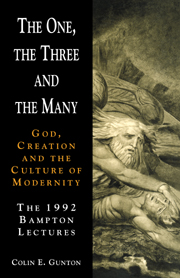Book contents
- Frontmatter
- Contents
- Preface
- Introduction
- PART ONE THE DISPLACEMENT OF GOD
- 1 From Heraclitus to Havel. The problem of the one and the many in modern life and thought
- 2 The disappearing other. The problem of the particular in modern life and thought
- 3 A plea for the present. The problem of relatedness in modern life and thought
- 4 The rootless will. The problem of meaning and truth in modern life and thought
- PART TWO RETHINKING CREATEDNESS
- Bibliography
- Index
4 - The rootless will. The problem of meaning and truth in modern life and thought
Published online by Cambridge University Press: 05 June 2012
- Frontmatter
- Contents
- Preface
- Introduction
- PART ONE THE DISPLACEMENT OF GOD
- 1 From Heraclitus to Havel. The problem of the one and the many in modern life and thought
- 2 The disappearing other. The problem of the particular in modern life and thought
- 3 A plea for the present. The problem of relatedness in modern life and thought
- 4 The rootless will. The problem of meaning and truth in modern life and thought
- PART TWO RETHINKING CREATEDNESS
- Bibliography
- Index
Summary
DISSENTING VOICES
In the previous chapters three aspects of a theology of modernity were traced, and there was an examination of the ways in which the modern world both arises out of the ancient and reduplicates, in its own distinctive ways, questionable features of antiquity's view of things. I argued that in both eras there are to be found grave deficiencies in the way in which the relation of the one and the many is conceived and practised, and that these in turn entail that the particularity of the many is in different ways endangered. The characteristic peril of the modern is to be found in the tendency to homogeneity, to the intellectual and social pressures by which the distinctive individuality of people and things is endangered. In Chapter 3, with particular reference to the concept of time, I examined one dimension of the way in which we conceive the relatedness of things, that is, the way in which the universe and its inhabitants are bound together. Here, too, there are symptoms of a lack of ease with living in the world, so that, paradoxically, the modern conquest of time has appeared to engender a new slavery, a tyranny of time, in which, once again, human and worldly integrity are brought into question. What makes modernity distinctive is its displacement of God. Modernity as an ideology arises not only out of antiquity, but also by means of an attempt in various ways to displace God as the transcendent focus of life in the world, that is, as the one who provides our being with its coordinates.
- Type
- Chapter
- Information
- The One, the Three and the Many , pp. 101 - 126Publisher: Cambridge University PressPrint publication year: 1993

